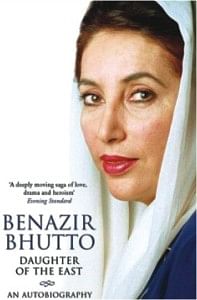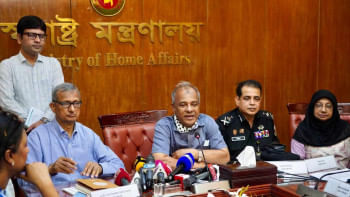An aunt, a niece. . . and the written word

Daughter of the East
Benazir Bhutto
Hamish Hamilton
William Dalrymple has perhaps rightly commented that if there is anyone born to write the Bhutto family's story, it is Fatima Bhutto. Songs of Blood and Sword, published by Penguin and Viking, is a sad but unputdownable. Fatima is the granddaughter of Zulfikar Ali Bhutto, Pakistan's first democratically elected Prime Minister - ousted by General Zia to be imprisoned and finally hanged in 1979. She is also niece to the first female prime minister in the Muslim world, Benazir Bhutto, assassinated in 2007. The writer lost both her uncle and her father in 1985 and 1996 respectively. As I was poring over the pages, I couldn't help remembering yet another book, Benazir Bhutto's Daughter of the East. Some of the episodes from the books were like looking at the same picture from different angles.
Fatima was barely in her teens when her father was brutally assassinated near their home in Karachi. So she followed the trails left by him all around the world to find out more about her father. It was a huge ordeal for her to know about her father's past and meet all the people who loved him. It was like broadening her horizon. She even met her father's ex-fiancée, who was a married woman at the time she was going out with Mir Murtaza. While the Bhutto brothers were living in Kabul which was as close as they could get to Pakistan, they married two Afghan sisters Fauzia and Rehana. Fatima was conceived even before her parents were married. Political turmoil made the brothers emigrate to France while Benazir was in England. The youngest of them all died "mysteriously" in France. This eventually broke Murtaza's marriage with Fauzia. Later he met a Lebanese woman named Ghinwa in Syria whom he married and had a son whom he named Zulfiker Ali Bhutto Junior. He came back to Pakistan while Benazir was running for elections for the second time. Murtaza was denied a ticket from the Pakistan People's Party. He decided to run independently.
Murtaza returned to Pakistan on 3 November 1993. He won the election as an independent candidate. His plane was turned back from Karachi airport and later he was arrested. Hundreds of supporters who came to receive him that night didn't get to see him as he was taken by the side exit to prison. When asked by the media if there were any problems between the siblings, Benazir answered, "He's in jail, yes I had him arrested, but aside from my brother being a terrorist we have no problems, only personal ones here and there."
She projected their differences as trivial, familial ones.
"There is no conflict between me and Benazir," Murtaza answered. Sometimes he called her Mrs Zardari because he said she had long since stopped behaving like a Bhutto. There were other differences as well. Murtaza didn't like the way Benazir was running the PPP and Benazir did whatever she could to keep her brother out of it. As Fatima explored her father's life it was quite a shock for her to find answers to many unanswered questions.
Fatima quotes Sohail, a friend of her father's:
"Its not about heirs or patriarchy…….. Mir had the same background as Benazir- he was a Bhutto, had strong relationship with his father too, and also struggled against a dictator. But that's all Benazir had. Murtaza had clean hands, the corruption- and compromise free record, and the ideological understanding of socialist politics. That's what threatened his sister."
Benazir's book starts with the chapter, Assassination of my father, whereas Fatima Bhutto begins her tale talking about her surroundings in Karachi in 2008. Later she goes on to describe the intricacies of political arena of present-day Pakistan, before going on to the day in September 1996 when her father was killed. There is a tale about her great grandfather named Murtaza, who was so good-looking that all the English women stared at him as he walked by. One such lady, the wife of a British emissary, fell in love with him and was poisoned by her husband when found out about the dalliance. Both Fatima and Benazir give this account while describing the family legacy. Benazir describes the story in a somewhat different tone in Daughter of the East.
On Pakistan's politics, both writers are unanimously agreed that Bengalis were maltreated by West Pakistan. Fatima says about 1971:
"The violence of the conflict was staggering. Reports from East Pakistan placed the number of civilian casualties in the millions, citing around 3 million killed.
In addition to reports of sanctioned violence towards women, there were charges leveled against the Pakistani Army for its use of violence towards intellectuals, academics and minorities, Hindus specially."
Benazir was studying at Harvard at the time and had supported her father's endeavours to keep Pakistan intact and put the blame on India as an aggressor. She admitted that the Bengalis were the denied their rights --- 80 percent of government jobs were allocated to the West, 90 percent of the armed forces also came from there. Urdu was declared the national language which only a few Bengalis understood. She goes on to write about the surrender of General Niazi
"As television cameras focused in, General Niazi approached his Indian counterpart, General Aurora, on the race course at Dacca. I couldn't believe my eyes when I saw General Niazi exchange swords with the conqueror of Dacca (they had been at Sundhurst together), and embrace him. Embrace him! Even the Nazis did not surrender in such a humiliating manner. As commander of a defeated army, Niazi would have acted for more honorably if he had shot himself."
Fatima Bhutto describes her feelings at finding out about her father's death:
"I don't remember how we got to Mideast or how we found ourselves in the large recovery room that Papa had been placed in.
I cried from the very rawest part of me, with my lungs and my soul fighting for the air. I wanted to black out, to fall and awake when this was all over. I couldn't say goodbye to my father, I couldn't accept that he had left me. My throat burnt and my body shook."
She said that when she called her Wadi (Benazir) on the night of her father's murder she was not given the phone as Zardari told her: " 'She can't speak, she's hysterical…..' As if on cue there was a loud wailing at the background. It had been quiet before, with no indication that anyone was in the room with Zardari."
It was Zardari who informed her that her father had been shot.
Benazir's father always wanted her to be part of the greater world. He would take the children to visit foreign dignitaries and he took them along on foreign visits. He emphasized good education and wrote numerous letters to both Benazir and Murtaza, giving them political advice while he was in jail. Benazir and her mother's house arrest is described in the autobiography in vivid detail. Her brother's party Al Zulfikar was considered to be the armed wing of PPP. And the papers reported that it was Murtaza who hijacked a plane, an act of terrorism.
In Daughter of the East, Benazir describes her life during and after the assassination of Zulfiker Ali Bhutto. She stayed in different jails till 1984. Solitary confinement for seven years had given her an aliment in her ear and left her frail physically. On her release in January 1984 she and her sister took a Swiss flight to Switzerland and then to London for her treatment. It was here that she campaigned against the military dictator and waited for the time to come back to her country. She published a paper named Amul from there. In 1985 Zia decided to go for an election. But the oppression and killing of political prisoners were continued. Finally she went back to Karachi in August 1985 to bury her brother Shahnawaz in their ancestral home in Larkana. Five days later she was again arrested by the military regime in Karachi, to be released in November to attend a French court hearing on her brother's murder inquiry. She finally came back to Lahore in 1985. There were millions of people to receive her that day, she writes. She describes her arranged marriage to Zardari and her son's birth in the last few chapters. She completed her book in 1988.
Fatima's book, however, finishes on a sad note. She says that she must move away from the shadows, the ghosts of her family. But she also says that she could never leave behind her father for whom she started writing this book. No matter how hard she tries to move away from Pakistan she can never do so.

 For all latest news, follow The Daily Star's Google News channel.
For all latest news, follow The Daily Star's Google News channel. 



Comments